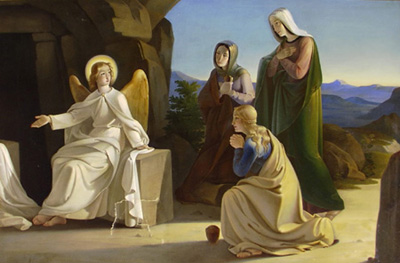
Introduction:
The Psalmist notes in Psalm 148:1-5,
“Praise the LORD! Praise the LORD from the heavens; Praise Him in the heights! 2 Praise Him, all His angels; Praise Him, all His hosts! 3 Praise Him, sun and moon; Praise Him, all stars of light! 4 Praise Him, highest heavens, And the waters that are above the heavens! 5 Let them praise the name of the LORD, For He commanded and they were created.”
The late Baptist theologian Augustus Hopkins Strong notes about the importance of studying angels:
“The doctrine of angels affords a barrier against the false conception of this world as including the whole spiritual universe. Earth is only part of a larger organism. As Christianity has united Jew and Gentile, so hereafter will it blend our own and other orders of creation."
Whenever anyone explores the various creatures in the Bible’s presentation of the supernatural realm such a study is called: “angelology”. Broadly speaking, the "good guys" in angelology represent varying orders of spiritual creatures, ranging from the highest level called, "the Divine Council (see Psalm 82, "sons of God") to that of a middle tier of beings known as, "Cherubim", "Seraphim" and "the watchers", to the third tier of every other spiritual being known simply as: "angels". This assortment of "good" spiritual beings populate God's invisible kingdom.
On the bad-side we have two other subheadings known as: “Satanology”, or the examination of Satan (his being, rebellion and work) and “demonology” (that is, the various ranks of spiritual beings). Satan and all the various sort of malevolent spiritual beings populate the parasitic "kingdom of darkness". Below we have a chart that depicts the Biblical supernatural realm. Notice that in the diagram, angels occupy the third or lowest tier of the spiritual creatures in God’s invisible kingdom.
In what remains, I want to offer a brief account of the angels as they are portrayed in the Bible. I hope this summary edifies and equips readers with a better working understanding of the Biblical doctrine of angels (known, as noted above, by the term: "angeology").
1. Angels are created beings.
We can note first, that like the other spiritual beings in the Biblical supernatural realm, angels are created beings. Psalm 148:5 notes that the angels were created by the command of God, just like the visible universe, stars, planets, life and humanity. Hebrews 1:7, quoting Psalm 104:4, states: “And of the angels He says,
“Who makes His angels winds, And His ministers a flame of fire.” From what we can discern from Job 38:1-7, the entire supernatural realm was created by God on either days 2 or 3 in the creative week.
2. There are Good and Bad Angels
When God originally created the angelic realm, they were all good. The creation of the supernatural realm was followed by the cosmic rebellion of Lucifer, which in turn influenced other spiritual beings to become the fallen angels (Isaiah 14:12-20; Ezekiel 28:13-19; Revelation 12:4). Some of those fallen angels are chained and some roam freely between here and the heavenly realms (2 Peter 2:4; Jude 1:6; Ephesians 6:10-11). Thankfully, there are 2/3 of the heavenly angels faithfully serving God and His people (1 Timothy 5:21; Hebrews 1:14).
3. Angels are powerful beings
Angels are dramatically powerful beings. In 2 Kings 19:35 we read: “Then it happened that night that the angel of the Lord went out and struck 185,000 in the camp of the Assyrians; and when men rose early in the morning, behold, all of them were dead.” Revelation 9:13-21 records a future time when God will release four angels to kill 1/3 of humanity in the judgment of The Great Tribulation.
4. Good Angels aid God’s people
Is it scriptural to say that angels are deployed by God to aid Christians in their walk of faith? Absolutely! Consider Psalm 91:11 "For He will give His angels charge concerning you, to guard you in all your ways." Old Testament saints had angels assist them (Genesis 18; Psalm 37:4; Daniel 10:11). We see angelic aid of Jesus and other believers in the New Testament (Matthew 4:11; Matthew 26:53; Luke 22:43; Acts 12:6-8; Acts 27:23-24). Without a doubt, Christians today can still experience angelic assistance when they least expect it (Hebrews 1:14; 13:2).
Scripture reveals how angels can protect believers (2 Kings 6; Psalm 34:7; 91:11 Hebrews 1:14); help in grasping God’s truth (Psalm 68:7; Matthew 28:5-7; Acts 1:9-11; Luke 2:14) and point to Christ’s deity (Psalm 68:17; Daniel 7:10-13; Matthew 28). The Book of Revelation illustrates how angels aid believers. It contains roughly 25% of the 300 times we find mention of the good angels in the Bible. Often, the Book of Revelation describes angels announcing something or explaining to John the meaning of the various visions.
Final thought of application:
Today's post was intended to offer a brief treatment of the subject of angels. We noted the following:
1. Angels are created beings.
2. There are good and bad angels.
3. Angels are powerful beings.
4. Good angels aid God's people.
The eighteenth-century preacher John Wesley once wrote the following about angels:
"They may assist us in our search after truth, remove many doubts and difficulties, throw light on what was before dark and obscure, and confirm us in the truth that is after godliness. They may warn us of evil in disguise; and place what is good, in a clear, strong light. They may gently move our will to embrace what is good, and fly from that which is evil. They may, many times, quicken our dull affections, increase our holy hope or filial fear, and assist us more ardently to love Him who has first loved us."








